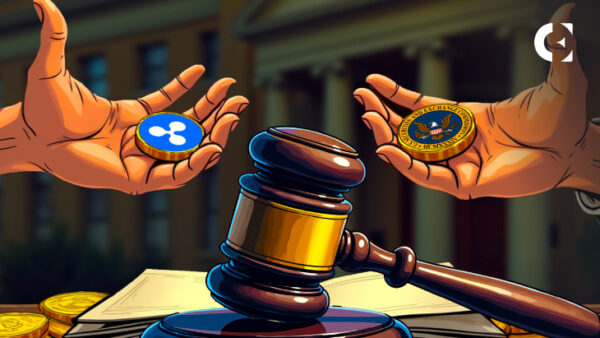- A rare public dissent from SEC Commissioner Crenshaw preceded the rejection of the deal
- Crenshaw argued the settlement would weaken the SEC’s authority and enforcement program
- Judge Torres’s final ruling directly aligned with the concerns raised by the commissioner
In the aftermath of Judge Analisa Torres’s surprise rejection of the Ripple-SEC settlement, a new narrative is emerging: the warning signs were there all along.
Legal analyst MetaLawMan is pointing to a rare public dissent from SEC Commissioner Caroline Crenshaw as the key signal that foreshadowed the deal’s collapse, suggesting the judge was not the only one with serious doubts.
What Was the Dissent That Signaled Trouble?
Before Judge Torres issued her ruling, SEC Commissioner Crenshaw took the unusual step of publicly stating her opposition to her own agency’s settlement with Ripple. In a powerful signal to the court, Crenshaw wrote,
“I cannot support our settlement. I urge the courts to take a long hard look at the Commission’s attempt to claw back the meritorious claims it previously made.”
According to Crenshaw, the deal would severely weaken the SEC’s authority and undo the integrity of its previous legal claims. Consequently, the judge’s latest move to uphold her earlier injunction and fine against Ripple signals her disapproval of both parties trying to sidestep judicial accountability.
Why Did Judge Torres Reject Joint SEC-Ripple Motion
In a ruling delivered Thursday, Judge Torres declined a joint motion filed by Ripple Labs and the SEC. The motion sought to reduce Ripple’s penalty from $125 million to $50 million and set aside a permanent injunction.
However, Torres firmly rejected that idea. She stated that neither side had demonstrated exceptional circumstances to justify such changes. According to her, the parties lacked the authority to undo a court’s final ruling, especially one involving violations of congressional law.
Related: Judge Torres Blocks Ripple–SEC Deal, XRP Case Heads for Prolonged Appeals
The case stems from Ripple’s sale of XRP, particularly $728 million in institutional transactions that Torres previously ruled as illegal securities offerings. Despite agreeing that XRP traded on public platforms does not meet the legal standard of a security, she stood by her injunction. Her position emphasized that courts not agencies or companies must enforce accountability when laws are broken.
What Happens Now in the Ripple Case?
The judge’s decision effectively unravels the settlement and puts the entire case back in motion. Stuart Alderoty, Ripple’s Chief Legal Officer, acknowledged the setback but noted that the company has yet to decide on its next legal step.
The SEC, on the other hand, declined to comment.
This case remains one of the highest-profile crypto enforcement actions in recent memory. XRP remains the fourth-largest cryptocurrency by market cap, according to CoinMarketCap. The development comes at a time when the SEC, under the second Trump administration, has been dropping other high-profile crypto cases.
Related: SEC v Ripple: How This Settlement Process Is Going
This ruling, however, serves as a stark reminder that the judiciary has the final say. The Ripple case remains open, highlighting the ongoing legal and regulatory battles that will continue to shape the crypto industry in the U.S.
Disclaimer: The information presented in this article is for informational and educational purposes only. The article does not constitute financial advice or advice of any kind. Coin Edition is not responsible for any losses incurred as a result of the utilization of content, products, or services mentioned. Readers are advised to exercise caution before taking any action related to the company.







